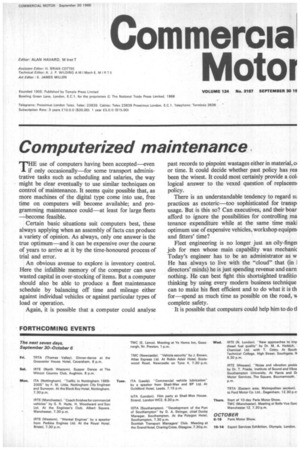Computerized maintenance
Page 49

If you've noticed an error in this article please click here to report it so we can fix it.
Ti!E use of computers having been accepted—even only occasionally—for some transport administrative tasks such as scheduling and salaries, the way might be clear eventually to use similar techniques on control of maintenance. It seems quite possible that, as more machines of the digital type come into use, free time on computers will become available; and programming maintenance could—at least for large fleets —become feasible.
Certain basic situations suit computers best, these always applying when an assembly of facts can produce a variety of opinion. As always, only one answer is the true optimum—and it can be expensive over the course of years to arrive at it by the time-honoured process of trial and error.
An obvious avenue to explore is inventory control. Here the infallible memory of the computer can save wasted capital in over-stocking of items. But a computer should also be able to produce a fleet maintenance schedule by balancing off time and mileage either against individual vehicles or against particular types of load or operation.
Again, it is possible that a computer could analyse
past records to pinpoint wastages either in material, CI or time. It could decide whether past policy has rea been the wisest. It could most certainly provide a col+ logical answer to the vexed question of replacemi policy.
There is an understandable tendency to regard su practices as esoteric—too sophisticated for trans'', usage. But is this so? Can executives, and their boar afford to ignore the possibilities for controlling ma tenance expenditure while at the same time maki optimum use of expensive vehicles, workshop equipm, and fitters' time?
Fleet engineering is no longer just an oily-fingei job for men whose main capability was mechanic Today's engineer has to be an administrator as w He has always to live with the "cloud" that (in 1 directors' minds) he is just spending revenue and earn nothing. He can best fight this shortsighted traditio thinking by using every modern business technique can to make his fleet efficient and to do what it is th for—spend as much time as possible on the road, A complete safety.
It is possible that computers could help him to do tl
















































































































































































































